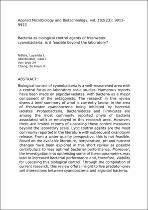 ResearchSpace
ResearchSpace
Bacteria as biological control agents of freshwater cyanobacteria: is it feasible beyond the laboratory?
JavaScript is disabled for your browser. Some features of this site may not work without it.
- ResearchSpace
- →
- Research Publications/Outputs
- →
- Journal Articles
- →
- View Item
| dc.contributor.author |
Ndlela, Luyanda L

|
|
| dc.contributor.author |
Oberholster, Paul J

|
|
| dc.contributor.author |
Van Wyk, JH

|
|
| dc.contributor.author |
Cheng, Po Hsun H

|
|
| dc.date.accessioned | 2019-02-06T12:52:04Z | |
| dc.date.available | 2019-02-06T12:52:04Z | |
| dc.date.issued | 2018-12 | |
| dc.identifier.citation | Ndlela, L.L. et al. 2018. Bacteria as biological control agents of freshwater cyanobacteria: is it feasible beyond the laboratory? Applied Microbiology and Biotechnology, vol. 102(23): 9911-9923 | en_US |
| dc.identifier.issn | 0175-7598 | |
| dc.identifier.issn | 1432-0614 | |
| dc.identifier.uri | https://doi.org/10.1007/s00253-018-9391-9 | |
| dc.identifier.uri | https://link.springer.com/article/10.1007%2Fs00253-018-9391-9 | |
| dc.identifier.uri | http://hdl.handle.net/10204/10680 | |
| dc.description | Copyright: 2018 Springer. Due to copyright restrictions, the attached PDF file only contains the abstract of the full text item. For access to the full text item, please consult the publisher's website. The definitive version of the work is published in Applied Microbiology and Biotechnology, vol. 102(23): 9911-9923 | en_US |
| dc.description.abstract | Biological control of cyanobacteria is a well-researched area with a central focus on laboratory-scale studies. Numerous reports have been made on algicidal isolates, with bacteria as a major component of the antagonists. The research in this review draws a brief summary of what is currently known in the area of freshwater cyanobacteria being inhibited by bacterial isolates. Proteobacteria, Bacteroidetes and Firmicutes are among the most commonly reported phyla of bacteria associated with or employed in this research area. However, there are limited reports of upscaling these control measures beyond the laboratory scale. Lytic control agents are the most commonly reported in the literature with subsequent cyanotoxin release. From a water quality perspective, this is not feasible. Based on the available literature, temperature, pH and nutrient changes have been explored in this short review as possible contributors to less optimal bacterial performance. Moreover, the investigation into optimising some of these parameters may lead to increased bacterial performance and, therefore, viability for upscaling this biological control. Through the compilation of current research, this review offers insight to live predator-prey cell interactions between cyanobacteria and algicidal bacteria. | en_US |
| dc.language.iso | en | en_US |
| dc.publisher | Springer | en_US |
| dc.relation.ispartofseries | Worklist;21771 | |
| dc.subject | Algicidal bacteria | en_US |
| dc.subject | Cyanobacterial inhibition | en_US |
| dc.subject | Biological control | en_US |
| dc.subject | Harmful algal blooms | en_US |
| dc.title | Bacteria as biological control agents of freshwater cyanobacteria: is it feasible beyond the laboratory? | en_US |
| dc.type | Article | en_US |
| dc.identifier.apacitation | Ndlela, L. L., Oberholster, P. J., Van Wyk, J., & Cheng, P. H. H. (2018). Bacteria as biological control agents of freshwater cyanobacteria: is it feasible beyond the laboratory?. http://hdl.handle.net/10204/10680 | en_ZA |
| dc.identifier.chicagocitation | Ndlela, Luyanda L, Paul J Oberholster, JH Van Wyk, and Po Hsun H Cheng "Bacteria as biological control agents of freshwater cyanobacteria: is it feasible beyond the laboratory?." (2018) http://hdl.handle.net/10204/10680 | en_ZA |
| dc.identifier.vancouvercitation | Ndlela LL, Oberholster PJ, Van Wyk J, Cheng PHH. Bacteria as biological control agents of freshwater cyanobacteria: is it feasible beyond the laboratory?. 2018; http://hdl.handle.net/10204/10680. | en_ZA |
| dc.identifier.ris | TY - Article AU - Ndlela, Luyanda L AU - Oberholster, Paul J AU - Van Wyk, JH AU - Cheng, Po Hsun H AB - Biological control of cyanobacteria is a well-researched area with a central focus on laboratory-scale studies. Numerous reports have been made on algicidal isolates, with bacteria as a major component of the antagonists. The research in this review draws a brief summary of what is currently known in the area of freshwater cyanobacteria being inhibited by bacterial isolates. Proteobacteria, Bacteroidetes and Firmicutes are among the most commonly reported phyla of bacteria associated with or employed in this research area. However, there are limited reports of upscaling these control measures beyond the laboratory scale. Lytic control agents are the most commonly reported in the literature with subsequent cyanotoxin release. From a water quality perspective, this is not feasible. Based on the available literature, temperature, pH and nutrient changes have been explored in this short review as possible contributors to less optimal bacterial performance. Moreover, the investigation into optimising some of these parameters may lead to increased bacterial performance and, therefore, viability for upscaling this biological control. Through the compilation of current research, this review offers insight to live predator-prey cell interactions between cyanobacteria and algicidal bacteria. DA - 2018-12 DB - ResearchSpace DP - CSIR KW - Algicidal bacteria KW - Cyanobacterial inhibition KW - Biological control KW - Harmful algal blooms LK - https://researchspace.csir.co.za PY - 2018 SM - 0175-7598 SM - 1432-0614 T1 - Bacteria as biological control agents of freshwater cyanobacteria: is it feasible beyond the laboratory? TI - Bacteria as biological control agents of freshwater cyanobacteria: is it feasible beyond the laboratory? UR - http://hdl.handle.net/10204/10680 ER - | en_ZA |





